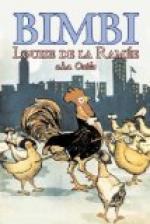Then August, terrified beyond all self-control, and dominated by one master-passion, sprang out of the body of the stove and fell at the feet of the speaker.
“Oh, let me stay! Pray, meinherr, let me stay!” he sobbed. “I have come all the way with Hirschvogel!”
Some gentlemen’s hands seized him, not gently by any means, and their lips angrily muttered in his ear, “Little knave, peace! be quiet! hold your tongue! It is the king!”
They were about to drag him out of the august atmosphere as if he had been some venomous, dangerous beast come there to slay, but the voice he had heard speak of the stove said, in kind accents, “Poor little child! he is very young. Let him go: let him speak to me.”
The word of a king is law to his courtiers: so, sorely against their wish, the angry and astonished chamberlains let August slide out of their grasp, and he stood there in his little rough sheepskin coat and his thick, mud-covered boots, with his curling hair all in a tangle, in the midst of the most beautiful chamber he had ever dreamed of, and in the presence of a young man with a beautiful dark face, and eyes full of dreams and fire; and the young man said to him:—
“My child, how came you here, hidden in this stove? Be not afraid: tell me the truth. I am the king.”
August, in an instinct of homage, cast his great battered black hat with the tarnished gold tassels down on the floor of the room, and folded his little brown hands in supplication. He was too intensely in earnest to be in any way abashed; he was too lifted out of himself by his love for Hirschvogel to be conscious of any awe before any earthly majesty. He was only so glad—so glad it was the king. Kings were always kind; so the Tyrolese think, who love their lords.
“Oh, dear king!” he said, with trembling entreaty in his faint little voice, “Hirschvogel was ours, and we have loved it all our lives; and father sold it. And when I saw that it did really go from us, then I said to myself I would go with it; and I have come all the way inside it. And last night it spoke and said beautiful things.
“And I do pray you to let me live with it, and I will go out every morning and cut wood for it and you, if only you will let me stay beside it. No one ever has fed it with fuel but me since I grew big enough, and it loves me,—it does indeed; it said so last night; and it said that it had been happier with us than if it were in any palace—”
And then his breath failed him, and, as he lifted his little, eager, pale face to the young king’s, great tears were falling down his cheeks.
Now, the king liked all poetic and uncommon things, and there was that in the child’s face which pleased and touched him. He motioned to his gentlemen to leave the little boy alone.
“What is your name?” he asked him.
“I am August Strehla. My father is Hans Strehla. We live in Hall, in the Innthal; and Hirschvogel has been ours so long—so long!”




